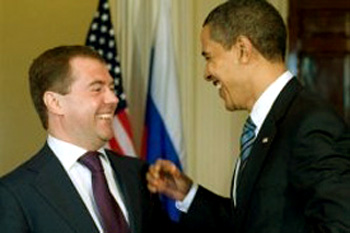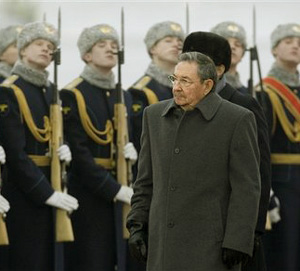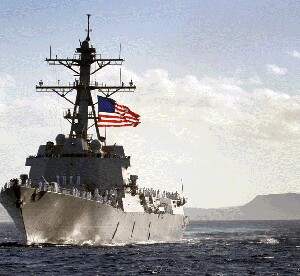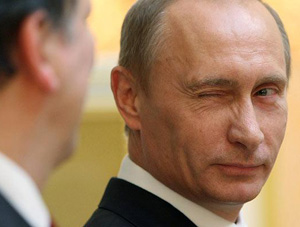 |
International Affairs
Russia, Obama and a ‘Constructive Meeting’
Toby Westerman
Reports coming from the meeting between U.S. President Barack Obama and Russian Federation President Dmitry Medvedev sound reassuring, but behind the apparent love feast is a stark, cold, and threatening reality far different from the optimism surrounding the encounter.

Obama and Medvedev: Jovial comrades |
The truth is that the diplomatic smiles of the Russian elite mask a world strategy meant to bring America to its knees. The strategy continues and will not abate, despite the Obama-Medvedev press releases.
In a statement to the press, President Barack Obama characterized his meeting with Russian Federation president Dmitry Medvedev, which occurred during the G20 summit in London, as the beginning of a "very constructive dialogue." And Medvedev declared that "there are many more positions that bring us together than those that pull us apart." A joint statement pledged a united effort in Afghanistan and against "Al-Qaeda and other terrorist and insurgent groups in Afghanistan and Pakistan," and seemed to promise progress on an agreement reducing nuclear weapons.
Internal policies recall the Old Soviet Union
Moscow appears to be a reasonable international partner, but the internal and external realities of the Russian Federation recall the old Soviet Union far more than the Russia that was promised by Boris Yeltsin and other Moscow politicians following the collapse of the Union of Soviet Socialist Republics.
Medvedev's Russia, like Vladimir Putin's Russia, is the home of suspicion, murder and state terror. Opposition journalists are often killed, and even lawyers seeking to defend journalists against State harassment are in danger, as the recent slaying of one well-known lawyer proved. Schools and news outlets preach distrust of the West, especially of the United States. Pro-Kremlin youth groups, usually dressed in Bolshevik revolutionary red, teach their young members hostility to the United States and attack those opposing official Russian policy.
The activist organization Memorial is often the target of official Russian displeasure. Memorial seeks to protect human rights in Russia and to uncover and preserve the memory of those who suffered and died during the oppression of the Soviet era. Memorial's offices have been raided, its files confiscated never to be returned.
The most recent work of one of the leading writers on the Soviet era, Orlando Figes, cannot find a publisher in Russia - evidence of a de facto ban. Figes had based much his book, The Whisperers: Private Life in Stalin's Russia, on material from Memorial.
External policies: US hostility
Around the world, Moscow is pursuing a course hostile to the United States.
Only a few weeks ago, a group of Russian "Swallow" bombers flew into Venezuela. Speculation soon followed - inspired by statements of a Russian general - that Moscow would establish bomber bases in Venezuela and Cuba, both of which are within striking distance of the United States.

Raul Castro reviews Russian troops in Moscow |
Moscow is selling sophisticated weapons to Venezuela's neo-Marxist tyrant, Hugo Chavez, and has granted a license to the Chavez regime for the manufacture of the AK103, one of the world's most advanced automatic assault rifles. There is strong indication that an unknown number of the 100,000 AK103s already sold directly to Chavez by Moscow may have been passed on to drug cartel militias now engaged in a savage civil war against the Mexican government.
The Island Gulag State of Cuba remains one of Moscow's "key allies" in the Latin American region. Moscow has recently assured Raul Castro, Fidel Castro's brother and successor, of its continued and enthusiastic support. As with almost all of the Russian press, the Russian news agency Itar-Tass is under the control of the Kremlin.
The deputy director-general of Itar-Tass, Michael Guzman, interviewed Raul before his late January-early February 2009 trip to Moscow. During the fawning interview, Guzman continually and respectfully referred to the new Cuban leader as "Comrade President."
The visit of the Russian bombers indicates that Chavez has very powerful friends willing to extend themselves into what had been regarded as "America's Backyard." Moscow's support of Cuba's 50-year communist dictatorship confirms an alliance that extends - without interruption - back to the Soviet era.

A US warship deploys as North Korea prepares its missiles |
In the Middle East, Moscow is the only reason that Iran has a nuclear capability and is able to threaten its neighbors - from Israel to Europe. It is Moscow that has sold sophisticated anti-aircraft missile batteries to Iran for the defense of those nuclear facilities.
At this writing, North Korea is preparing a missile for launch that may be able to reach the United States with a nuclear weapon. The Stalinist dictatorship also has hundreds of thousands of troops ready at the whim of the "Beloved Leader" to attack American soldiers and their South Korean allies. Neither Stalinist North Korea, nor the "Beloved Leader," could exist without the support of Moscow.
Russian aid has also made possible the Chinese military build-up which now threatens the United States and its allies in the Asia-Pacific region. For well over a decade Russia has supplied China with weapons technology and training for the Peoples Liberation Army (PLA). U.S. aircraft carrier groups are vulnerable to a Chinese ballistic strike, and almost every nation on earth is vulnerable to a Chinese cyber attack. Russian forces have staged extensive military exercises with the increasingly sophisticated PLA.
New threats looming
Russia's attack on the small Caucasus nation of Georgia shocked the world, and now Moscow recognizes as independent the rebel regions it helped sever from Georgia. This past winter Russia cut off natural gas supplies to Ukraine during a dispute over pricing. In terminating Ukraine's access, Russia also endangered gas delivery to much of Western Europe, which soon learned that dependence on Moscow comes at a high price.

A crafty Putin controling the game |
As Arctic ice melts and reveals extraordinary deposits of natural resources, the nations bordering on the Arctic Ocean are pressing their claims to the newly available wealth. To assert its interests, Russia is preparing for possible military operations in the region. As Russian bombers prowl off the southern coast of Alaska, specially trained Russian troops are engaging in military exercises in preparation for action in the Arctic, a conflict which could easily involve the northern coast of Alaska.
The last Democratic president to engage Russia was Bill Clinton in the 1990s. Russia at that time was weak and in the early stages of recovering from the shock of the collapse of the USSR. On the other hand, America was strong in every way, the only remaining superpower.
Now, the situation is dramatically different. Russia is strong thanks to its tremendous natural resources, and America is weakened from its excessive spending policies, especially those enacted in the last few weeks by the new administration.
The Russian bear is again walking upright and - thanks to Moscow's political elite - the bear is hungry. Obama, America's policy-makers and the American public must beware of the embrace, no matter how warm, of the stalking bear.

Posted April 3, 2009
Toby Westerman publishes
International News Analysis - Today
An investigative, analytical, and uncompromising weekly analysis of the world situation
Contact T. Westerman at
www.inatoday.com
or P.O. BOX 5182, Rockford, ILL, 61125-0182

Related Topics of Interest
 The Bear in the Sun The Bear in the Sun
 Vatican Has No Plans to Convert Russia Vatican Has No Plans to Convert Russia
 Moscow's New Onslaught Moscow's New Onslaught
 A Socialist West? When? A Socialist West? When?
 Russian Tanks Roll in Soviet-Style Agression Russian Tanks Roll in Soviet-Style Agression
 The Closest Thing Possible to Stalinism The Closest Thing Possible to Stalinism

Related Works of Interest
|
|
International Affairs | Hot Topics | Home | Books | CDs | Search | Contact Us | Donate

© 2002- Tradition in Action, Inc. All Rights
Reserved
|
 |
|